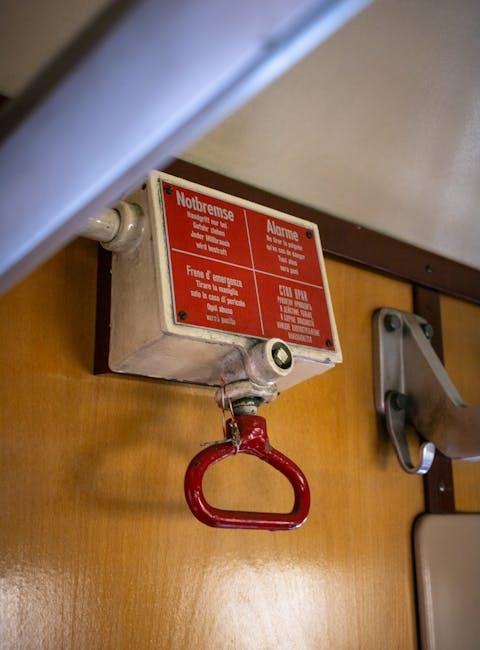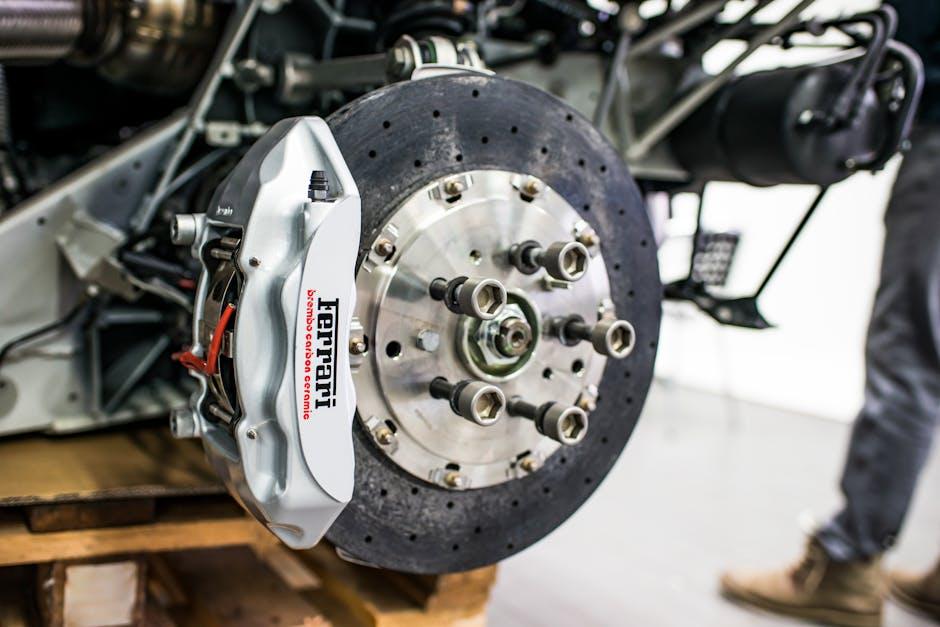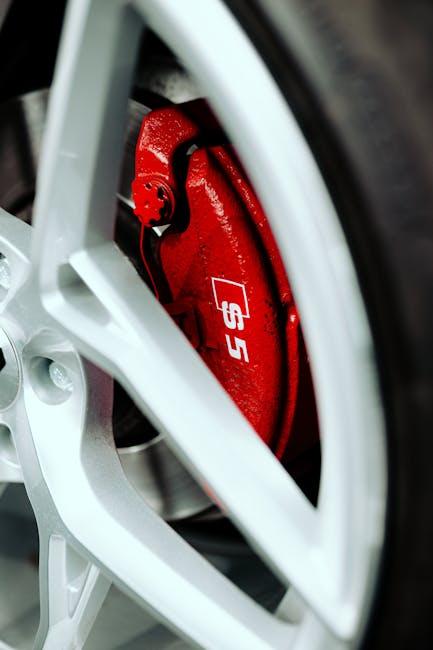Imagine cruising down an open highway, the sun warming your face and the hum of the engine a steady companion. Suddenly, the unexpected—a slight press on the brake pedal yields no response. In those critical moments, brake failure isn’t just an inconvenience; it can become a life-threatening emergency. Understanding how to avoid brake failure on the road is essential for every driver, blending attentive maintenance with smart habits. This article explores practical steps and preventive measures that keep your brakes reliable, ensuring your journeys stay safe and under control.
Table of Contents
- Understanding the Common Causes of Brake Failure
- Recognizing Early Warning Signs to Act Swiftly
- Essential Brake Maintenance Tips for Every Driver
- Choosing the Right Brake Components for Safety and Performance
- How Weather Conditions Impact Brake Efficiency
- Emergency Procedures to Follow When Brakes Fail
- Q&A
- Wrapping Up

Understanding the Common Causes of Brake Failure
Brake failure often stems from a variety of underlying issues, many of which can be easily overlooked during routine vehicle maintenance. One of the most frequent culprits is worn brake pads. As these pads wear down, the system loses its ability to generate the necessary friction to slow the vehicle efficiently. Another common factor is fluid leakage in the brake lines or reservoirs, which diminishes hydraulic pressure and can lead to pedal sponginess or total brake loss. Additionally, overheating from excessive braking, especially on steep descents, causes brake fade—a temporary reduction in stopping power caused by heat degradation of brake components.
Here are some typical causes that contribute to brake failure and what happens in each case:
| Cause | Effect on Braking System |
|---|---|
| Worn Brake Pads | Reduced friction and longer stopping distances |
| Brake Fluid Leak | Loss of hydraulic pressure leading to pedal sinking |
| Overheated Brakes | Brake fade and temporary loss of braking power |
| Damaged Brake Lines | Potential for sudden complete brake failure |
| Faulty Brake Master Cylinder | Irregular pedal feel and inconsistent brake response |
- Corroded or damaged brake components impair system reliability and safety.
- Contaminated brake fluid reduces hydraulic efficiency and accelerates wear.
- Ignorance of warning signs, like squealing or grinding noises, worsens deterioration.
Staying vigilant about these common causes and recognizing early warning signs can be the key to maintaining a reliable braking system and ensuring safety on the road.

Recognizing Early Warning Signs to Act Swiftly
Brake failure often creeps in quietly, but there are distinct signals that every driver should keep an eye on to avoid dangerous situations. Unusual noises like squealing or grinding when you press the brake pedal can indicate worn brake pads or rotors. Similarly, a spongy or soft brake pedal often suggests air in the brake lines or a leak in the hydraulic system. If your vehicle pulls to one side when braking, it might be a sign of uneven brake pad wear or a malfunctioning caliper. Ignoring these symptoms can lead to catastrophic brake failure on the road.
Being proactive means routinely performing these quick checks and reacting promptly whenever something feels off:
- Listen closely for any brake-related sounds during routine driving.
- Observe pedal response—if it feels different from usual, get it inspected.
- Notice if the car drifts or pulls during braking; this requires immediate attention.
- Check brake fluid levels regularly; low fluid can indicate leaks or worn components.
| Warning Sign | Possible Cause | Recommended Action |
|---|---|---|
| Squealing Noise | Worn Brake Pads | Replace Brake Pads Immediately |
| Soft Pedal | Air in Brake Lines | Bleed Brakes and Inspect for Leaks |
| Car Pulls to One Side | Uneven Wear or Faulty Caliper | Professional Brake System Check |
| Low Brake Fluid | Leaks or Worn Parts | Top Off Fluid and Find Leak Source |

Essential Brake Maintenance Tips for Every Driver
Brakes are undeniably one of the most critical safety components of any vehicle, and maintaining them should never be overlooked. Regularly inspect your brake pads and rotors for wear and tear, listening carefully for unusual squealing or grinding noises which often signal that replacement is due. Ensuring your brake fluid is at the proper level and free from contamination keeps the hydraulic system functioning smoothly. Remember to flush and replace brake fluid per your vehicle manufacturer’s schedule to prevent moisture buildup and corrosion.
Adopting a proactive approach can save you from unexpected brake failure and costly repairs. Key maintenance practices to keep in mind include:
- Checking brake lines for cracks or leaks
- Testing brake responsiveness in safe conditions
- Replacing worn brake pads promptly
- Keeping tires properly inflated to support optimal braking
| Maintenance Task | Recommended Frequency | Why It Matters |
|---|---|---|
| Brake Pad Inspection | Every 10,000 miles | Prevents rotor damage |
| Brake Fluid Replacement | Every 2 years | Maintains fluid integrity |
| Brake Line Check | Annually | Avoids leaks and failure |
| Brake System Test | Every 6 months | Ensures consistent responsiveness |

Choosing the Right Brake Components for Safety and Performance
When it comes to maintaining brake reliability, selecting the correct components is crucial for both safety and optimal performance. Not all brake pads or rotors are created equal—materials like ceramic, semi-metallic, and organic offer distinct benefits depending on your vehicle type and driving conditions. For instance, ceramic pads provide quieter braking with less dust, while semi-metallic pads excel in heat dissipation and durability. Equipping your car with the wrong brake parts can lead to premature wear, reduced stopping power, or even unexpected failures on the road.
Before making a purchase, consider these key factors to get the most out of your brakes:
- Compatibility: Ensure the parts match your vehicle’s make and model for proper fitment.
- Driving Style: Choose components suited for city commutes or aggressive driving.
- Environmental Conditions: Wet or mountainous terrain demands specialized materials.
- Maintenance Interval: Some components last longer but might require extra care.
| Component | Best Use | Key Benefit |
|---|---|---|
| Ceramic Brake Pads | Daily driving, quiet operation | Low dust and noise |
| Semi-Metallic Pads | Performance driving, heavy loads | Excellent heat resistance |
| Drilled Rotors | Wet conditions, performance | Improved heat and water dissipation |

How Weather Conditions Impact Brake Efficiency
Brake efficiency is highly sensitive to changing weather conditions, and understanding these variations can help you maintain safer road performance. In damp or rainy weather, moisture can cling to brake components, causing a temporary reduction in friction between the brake pads and rotors. This often results in longer stopping distances and the unsettling feeling of “spongy” brakes. In cold weather, brake fluid can thicken, and icy roads reduce tire traction, forcing brakes to work harder to stop the vehicle effectively. Meanwhile, extreme heat can lead to brake fade, where excessive temperatures cause the brake pads to lose their grip, reducing responsiveness just when you need them most.
To better grasp these impacts, consider the following conditions and their typical effects on braking:
- Rain and Humidity: Moisture reduces pad-to-rotor friction; risk of corrosion increases.
- Cold and Frost: Brake fluid viscosity increases; surfaces may freeze, reducing effectiveness.
- Hot and Dry: Brake fade due to overheating; accelerated pad wear.
| Weather Condition | Impact on Brakes | Best Practice |
|---|---|---|
| Rainy | Slippery disc surface; increased stopping distance | Test brakes gently after rain begins |
| Snow/Icy | Reduced traction; slower brake response | Use winter tires; drive cautiously |
| Hot | Brake pad overheating; fade risk | Allow brakes to cool; avoid constant hard braking |

Emergency Procedures to Follow When Brakes Fail
When you find yourself in a situation where your brakes are unresponsive, it’s crucial to remain calm and act swiftly. First, try to downshift your vehicle to a lower gear, which can help slow your car naturally without relying on the brakes. Simultaneously, pump the brake pedal hard and repeatedly to build up brake fluid pressure. If this fails, engage the emergency (hand) brake gently, as pulling it suddenly can cause your wheels to lock and lead to loss of control. Always keep your eyes on the road and look for a safe area to steer your vehicle, such as the shoulder or an uphill gradient that can assist in reducing your speed.
Meanwhile, use your horn and hazard lights to alert other drivers to your emergency. If conditions permit, try to navigate towards a clear, open space like an empty parking lot or a grassy area to come to a controlled stop. Avoid turning off the engine immediately after stopping, as this might make steering difficult. Familiarize yourself with these steps ahead of time—your quick thinking can make a significant difference when seconds count.
Q&A
Q: What are the most common causes of brake failure while driving?
A: Brake failure can stem from worn brake pads, low brake fluid, damaged brake lines, overheating brakes, or air trapped in the brake system. Regular maintenance and attentive driving can help catch these issues before they become dangerous.
Q: How often should I have my brakes inspected to prevent failure?
A: It’s wise to have your brakes checked at least once a year or every 12,000 miles, whichever comes first. However, if you notice squeaking, grinding, or reduced responsiveness, seek immediate inspection regardless of the schedule.
Q: What are some signs that my brakes might be failing?
A: Warning signs include a spongy pedal feel, longer stopping distances, a burning smell near the wheels, brake warning lights on the dashboard, and unusual noises like grinding or squealing.
Q: Can driving habits influence the risk of brake failure?
A: Absolutely. Riding the brakes down long hills, abrupt and frequent hard stops, or carrying excessive loads can cause your brakes to overheat and wear out faster, increasing the chance of failure.
Q: What should I do if my brakes begin to fail while driving?
A: Stay calm and do not panic. Gradually release the brake pedal and try pumping it to restore pressure. Use engine braking by downshifting, gently apply the emergency brake, and steer safely to the side of the road. Avoid abrupt maneuvers.
Q: Are there any preventative measures I can take beyond regular maintenance?
A: Yes, driving smoothly, avoiding overloading your vehicle, and reducing brake usage on long descents by using lower gears can help extend brake life and prevent overheating.
Q: Is it safe to drive with low brake fluid?
A: No, low brake fluid can significantly impair braking efficiency. If you notice low fluid levels, address it immediately by checking for leaks and topping off the fluid, or better yet, have a professional inspect your brake system.
Q: How does weather affect brake performance and failure risk?
A: Wet or icy conditions can reduce brake traction and effectiveness but don’t directly cause failure. However, moisture can accelerate corrosion in brake components if exposed for extended periods, potentially leading to issues down the line.
Q: Should I consider upgrading my brake system for added safety?
A: For drivers who frequently tow heavy loads, drive in mountainous terrain, or enjoy spirited driving, upgrading to high-performance brake pads and rotors can improve heat dissipation and durability, reducing failure risks.
Q: Is brake failure covered by vehicle warranties or insurance?
A: Brake wear from normal use is typically not covered under warranties. However, if failure is due to a manufacturing defect, warranty coverage may apply. Insurance usually covers accidents resulting from brake failure, but it varies by policy. Always review your specific coverage.
Wrapping Up
In the dance between machine and asphalt, your brakes are the silent guardians that ensure every step is safe and sound. By understanding the signs, committing to regular maintenance, and respecting the limits of your vehicle, you transform potential hazards into mere whispers on the road. Remember, avoiding brake failure isn’t just about preserving parts—it’s about protecting lives, including your own. So, take a moment today to check, care, and prepare. Because every journey deserves a confident stop.


483 Comments
feaoyx
feaoyx
uovxwb
m3ymr4
fjd64a
zo5uc8
wz626r
nwfoh7
heqozk
w6938x
https://t.me/s/Online_1_xbet/48
https://t.me/s/Online_1_xbet/2390
https://t.me/s/Official_1xbet_1xbet
https://t.me/rating_online
https://t.me/rating_online/3
https://t.me/s/rating_online/9
https://t.me/s/rating_online/7
https://t.me/rating_online/4
https://t.me/s/rating_online/6
https://t.me/s/rating_online/8
https://t.me/s/rating_online/13
https://t.me/Online_1_xbet/2959
https://t.me/Online_1_xbet/2190
https://t.me/Online_1_xbet/3361
https://t.me/Online_1_xbet/3189
tu3vlr
https://t.me/Online_1_xbet/3552
https://t.me/Online_1_xbet/3103
https://t.me/Online_1_xbet/2533
https://t.me/Online_1_xbet/1802
https://t.me/Online_1_xbet/2693
https://t.me/Online_1_xbet/3207
https://t.me/Online_1_xbet/2067
https://t.me/Official_1xbet_1xbet/s/1079
https://t.me/Official_1xbet_1xbet/s/1157
https://t.me/Official_1xbet_1xbet/s/437
https://t.me/Official_1xbet_1xbet/s/920
https://t.me/Official_1xbet_1xbet/s/1409
https://t.me/Official_1xbet_1xbet/s/116
https://t.me/Official_1xbet_1xbet/s/1097
https://t.me/Official_1xbet_1xbet/s/815
https://t.me/Official_1xbet_1xbet/s/1341
https://t.me/Official_1xbet_1xbet/s/1005
https://t.me/Official_1xbet_1xbet/s/957
https://t.me/Official_1xbet_1xbet/s/168
https://t.me/Official_1xbet_1xbet/s/48
https://t.me/Official_1xbet_1xbet/s/459
https://t.me/Official_1xbet_1xbet/s/1124
https://t.me/Official_1xbet_1xbet/s/94
https://t.me/Official_1xbet_1xbet/s/759
https://t.me/Official_1xbet_1xbet/s/470
https://t.me/Official_1xbet_1xbet/s/312
https://t.me/Official_1xbet_1xbet/s/1346
https://t.me/Official_1xbet_1xbet/s/206
https://t.me/Official_1xbet_1xbet/s/211
https://t.me/Official_1xbet_1xbet/s/568
https://t.me/Official_1xbet_1xbet/s/915
https://t.me/Official_1xbet_1xbet/s/217
https://t.me/Official_1xbet_1xbet/s/1335
https://t.me/Official_1xbet_1xbet/s/1502
https://t.me/Official_1xbet_1xbet/s/96
https://t.me/Official_1xbet_1xbet/s/363
https://t.me/Official_1xbet_1xbet/s/998
https://t.me/Official_1xbet_1xbet/s/1442
https://t.me/Official_1xbet_1xbet/s/1225
https://t.me/Official_1xbet_1xbet/s/1289
https://t.me/Official_1xbet_1xbet/s/611
https://t.me/Official_1xbet_1xbet/s/416
https://t.me/Official_1xbet_1xbet/s/1440
https://t.me/Official_1xbet_1xbet/s/1082
https://t.me/Official_1xbet_1xbet/s/770
https://t.me/Official_1xbet_1xbet/s/418
https://t.me/Official_1xbet_1xbet/s/1368
https://t.me/Official_1xbet_1xbet/s/685
https://t.me/Official_1xbet_1xbet/s/349
https://t.me/Official_1xbet_1xbet/s/353
https://t.me/Official_1xbet_1xbet/s/97
https://t.me/Official_1xbet_1xbet/s/518
https://t.me/Official_1xbet_1xbet/s/1503
https://t.me/Official_1xbet_1xbet/s/1233
https://t.me/Official_1xbet_1xbet/1800
https://t.me/Official_1xbet_1xbet/1706
https://t.me/Official_1xbet_1xbet/1682
https://t.me/s/Official_1xbet_1xbet/1649
https://t.me/s/Official_1xbet_1xbet/1729
https://t.me/Official_1xbet_1xbet/1765
https://t.me/s/Official_1xbet_1xbet/1725
https://t.me/s/Official_1xbet_1xbet/1754
https://t.me/Official_1xbet_1xbet/1802
https://t.me/Official_1xbet_1xbet/1596
https://t.me/Official_1xbet_1xbet/1842
https://t.me/s/Official_1xbet_1xbet/1704
https://t.me/s/Official_1xbet_1xbet/1814
https://t.me/Official_1xbet_1xbet/1856
https://t.me/Official_1xbet_1xbet/1629
https://t.me/s/Official_1xbet_1xbet/1798
https://t.me/s/Official_1xbet_1xbet/1815
https://t.me/Official_1xbet_1xbet/1764
https://t.me/Official_1xbet_1xbet/1630
https://t.me/s/Official_1xbet_1xbet/1691
https://t.me/s/Official_1xbet_1xbet/1666
https://t.me/s/Official_1xbet_1xbet/1690
https://t.me/Official_1xbet_1xbet/1628
https://t.me/Official_1xbet_1xbet/1773
https://t.me/Official_1xbet_1xbet/1627
https://t.me/Official_1xbet_1xbet/1797
https://t.me/Official_1xbet_1xbet/1623
https://t.me/s/Official_1xbet_1xbet/1742
https://t.me/s/Official_1xbet_1xbet/1756
https://t.me/s/Official_1xbet_1xbet/1800
https://t.me/Official_1xbet_1xbet/1777
https://t.me/Official_1xbet_1xbet/1650
https://t.me/s/Official_1xbet_1xbet/1631
https://t.me/s/Official_1xbet_1xbet/1733
https://t.me/s/Official_1xbet_1xbet/1853
https://t.me/s/Official_1xbet_1xbet/1825
https://t.me/s/Official_1xbet_1xbet/1676
https://t.me/Official_1xbet_1xbet/1672
https://t.me/s/Official_1xbet_1xbet/1736
https://t.me/s/Official_1xbet_1xbet/1854
https://t.me/Official_1xbet_1xbet/1656
https://t.me/s/Official_1xbet_1xbet/1849
https://t.me/Official_1xbet_1xbet/1690
https://t.me/s/Official_1xbet_1xbet/1747
https://t.me/s/Official_1xbet_1xbet/1778
https://t.me/s/Official_1xbet_1xbet/1680
https://t.me/Official_1xbet_1xbet/1752
https://t.me/s/Official_1xbet_1xbet/1805
https://t.me/s/Official_1xbet_1xbet/1640
https://t.me/s/Official_1xbet_1xbet/1710
https://t.me/s/Official_1xbet_1xbet/1740
https://t.me/Official_1xbet_1xbet/1826
https://t.me/Official_1xbet_1xbet/1852
https://t.me/Official_1xbet_1xbet/1819
https://t.me/Official_1xbet_1xbet/1632
https://t.me/Official_1xbet_1xbet/1811
https://t.me/Official_1xbet_1xbet/1673
https://t.me/Official_1xbet_1xbet/1671
https://t.me/Official_1xbet_1xbet/1740
https://t.me/Official_1xbet_1xbet/1653
https://t.me/Official_1xbet_1xbet/1652
https://t.me/Official_1xbet_1xbet/1712
https://t.me/s/Official_1xbet_1xbet/1732
https://t.me/Official_1xbet_1xbet/1840
https://t.me/s/topslotov
3w42sz
[https://t.me/s/official_1win_aviator](https://t.me/s/official_1win_aviator)
https://t.me/reiting_top10_casino/6
https://t.me/s/reiting_top10_casino/6
https://t.me/reiting_top10_casino/8
https://t.me/s/reiting_top10_casino/5
https://t.me/reiting_top10_casino/2
https://t.me/reiting_top10_casino/3
https://t.me/reiting_top10_casino/10
https://t.me/s/reiting_top10_casino/10
https://t.me/s/reiting_top10_casino/8
https://t.me/reiting_top10_casino/5
https://t.me/s/reiting_top10_casino/9
https://t.me/s/reiting_top10_casino/2
https://t.me/reiting_top10_casino/4
https://t.me/s/reiting_top10_casino/4
https://t.me/reiting_top10_casino
https://t.me/s/reiting_top10_casino/7
https://t.me/s/reiting_top10_casino
https://t.me/reiting_top10_casino/7
https://t.me/s/Gaming_1xbet
https://t.me/s/PlayCasino_1win
https://t.me/s/PlayCasino_1xbet
https://t.me/s/PlayCasino_1xbet
https://t.me/s/PlayCasino_1win
https://t.me/s/ofitsialniy_1win/33/evith
https://t.me/s/ofitsialniy_1win
https://t.me/s/Official_beefcasino
https://t.me/s/iw_1xbet
n38lik
https://t.me/s/bs_1xbet/50
https://t.me/bs_1xbet/42
https://t.me/bs_1xbet/32
https://t.me/s/bs_1xbet/38
https://t.me/bs_1xbet/42
https://t.me/bs_1xbet/40
https://t.me/s/bs_1xbet/50
https://t.me/s/bs_1xbet/46
https://t.me/bs_1xbet/20
https://t.me/bs_1xbet/3
https://t.me/bs_1xbet/2
https://t.me/bs_1xbet/37
https://t.me/s/bs_1xbet/24
https://t.me/bs_1xbet/16
https://t.me/s/bs_1xbet/21
https://t.me/bs_1xbet/50
https://t.me/s/bs_1xbet/34
https://t.me/bs_1xbet/25
https://t.me/bs_1xbet/48
https://t.me/s/bs_1xbet/32
https://t.me/s/bs_1xbet/26
https://t.me/s/bs_1xbet/2
https://t.me/s/bs_1xbet/8
https://t.me/bs_1xbet/41
https://t.me/bs_1xbet/12
https://t.me/bs_1xbet/12
https://t.me/s/bs_1xbet/27
https://t.me/s/bs_1xbet/27
https://t.me/s/bs_1xbet/23
https://t.me/bs_1xbet/41
https://t.me/bs_1xbet/26
https://t.me/bs_1xbet/44
https://t.me/bs_1xbet/40
https://t.me/s/bs_1xbet/25
https://t.me/s/bs_1xbet/14
https://t.me/s/bs_1xbet/28
https://t.me/bs_1xbet/3
https://t.me/bs_1xbet/6
https://t.me/s/bs_1xbet/10
https://t.me/s/bs_1xbet/37
https://t.me/bs_1xbet/15
https://t.me/s/bs_1xbet/23
https://t.me/jw_1xbet/108
https://t.me/s/jw_1xbet/955
https://t.me/jw_1xbet/28
https://t.me/jw_1xbet/987
https://t.me/s/jw_1xbet/397
https://t.me/jw_1xbet/245
https://t.me/s/bs_1Win/1045
https://t.me/s/bs_1Win/1292
https://t.me/s/bs_1Win/736
https://t.me/bs_1Win/548
https://t.me/s/bs_1Win/873
https://t.me/bs_1Win/1094
https://t.me/s/bs_1Win/738
https://t.me/bs_1Win/701
https://t.me/bs_1Win/589
https://t.me/bs_1Win/959
https://t.me/bs_1Win/930
https://t.me/bs_1Win/874
https://t.me/s/Official_mellstroy_casino/20
https://t.me/s/Official_mellstroy_casino/31
https://t.me/s/Beefcasino_rus/48
https://t.me/Official_mellstroy_casino/49
https://t.me/Official_mellstroy_casino/56
https://t.me/Official_mellstroy_casino/46
https://t.me/s/Official_mellstroy_casino/13
https://t.me/s/Official_mellstroy_casino/30
https://t.me/s/Official_mellstroy_casino/12
https://t.me/Official_mellstroy_casino/8
https://t.me/s/Official_mellstroy_casino/11
https://t.me/s/Official_mellstroy_casino/56
https://t.me/s/Best_promocode_rus/1835
https://t.me/Best_promocode_rus/3310
https://t.me/s/Beefcasino_rus/57
https://t.me/ud_Pin_Up/53
https://t.me/s/ud_Fresh/50
https://t.me/ud_Gizbo/58
https://t.me/s/ud_Starda/50
https://t.me/s/ud_Riobet/55
https://t.me/ud_Casino_X/56
https://t.me/ud_MrBit/58
https://t.me/s/ud_CatCasino/50
https://t.me/s/ud_Starda/46
https://t.me/s/ud_Sol/64
https://t.me/s/ud_Vulkan/54
https://t.me/s/ud_Pin_Up/56
https://t.me/s/ud_PlayFortuna/58
https://t.me/s/?ud_1Go/61
https://t.me/s/ud_Drip/50
https://t.me/s/ud_Casino_X/47
https://t.me/s/Beefcasino_rus/59
https://t.me/s/ud_Gizbo/64
https://t.me/ud_Monro/48
https://t.me/s/ud_Riobet/46
https://t.me/s/ud_Lex/57
https://t.me/s/ud_Casino_X/58
https://t.me/s/ud_1xSlots/63
https://t.me/ud_Leon/58
https://t.me/ud_Lex/46
https://t.me/s/ud_Rox/61
https://t.me/ud_Stake/51
https://t.me/ud_Irwin/18
https://t.me/ud_Daddy/25
https://t.me/s/ud_Gizbo/26
https://t.me/s/ud_voDkA
https://t.me/s/uD_CASinO_X
https://t.me/s/UD_BOoI
https://t.me/s/uD_stArda
https://t.me/s/ud_1Go
https://t.me/s/UD_LegzO
https://t.me/s/UD_PlAYfoRtuNA
https://t.me/s/official_1win_aviator/38
https://t.me/s/Ud_pIn_up
https://t.me/s/uD_MOSTBEt
https://t.me/s/official_1win_aviator/73
https://t.me/s/UD_iRWIn
https://t.me/s/Ud_FlagMAN
https://t.me/s/UD_VULKAN
https://t.me/s/Beefcasino_rus
https://t.me/s/tf_1win
https://t.me/s/tf_1win
https://t.me/s/tf_1win
https://t.me/official_1win_aviator/56
https://t.me/s/Top_bk_ru
https://t.me/s/kfo_1win
https://t.me/s/UD_pokeRdOM
https://t.me/s/ud_MOstBeT
https://t.me/s/uD_fLAgmAn
https://t.me/s/ud_1xSlOtS
https://t.me/s/uD_StAkE
https://t.me/s/ud_MRbIt
https://t.me/s/Ud_joYCASino
https://t.me/s/Ud_LEX
https://t.me/s/ud_riObet
https://t.me/s/ud_keNT
https://t.me/s/ud_1Go
https://t.me/s/UD_vULKAn
https://t.me/s/ud_gIZbo
https://t.me/s/ud_PLAYfortunA
https://t.me/s/ke_Pokerdom
https://t.me/s/ke_Fresh
https://t.me/s/ke_1xbet
https://t.me/s/official_1win_aviator/255
https://t.me/s/ke_Izzi
https://t.me/s/ke_Jet
https://t.me/s/ke_CatCasino
https://t.me/s/ke_Daddy
https://t.me/s/ke_Kometa
https://t.me/s/ke_mellstroy
https://t.me/s/ke_Booi
https://t.me/s/ke_Vulkan
https://t.me/s/ke_Leon
https://t.me/s/ke_Pin_Up
https://t.me/s/ke_Monro
https://t.me/s/ke_1Go
https://t.me/s/ke_GGBet
https://t.me/s/ke_1xSlots
https://t.me/s/ke_Gama
https://t.me/s/ke_Stake
https://t.me/s/kef_Lex
https://t.me/s/ke_Pinco
https://t.me/s/ke_kent
https://t.me/s/kef_Rox
https://t.me/s/ke_MostBet
https://t.me/s/kef_R7
https://t.me/s/ke_Riobet
https://t.me/s/ke_Flagman
https://t.me/s/ke_1Win
https://t.me/s/ke_Gizbo
https://t.me/official_1win_aviator/488
https://t.me/s/official_1win_aviator/80
https://t.me/s/ke_Casino_X
https://t.me/s/ke_Starda
https://t.me/s/ke_Martin
https://t.me/s/ke_Irwin
https://t.me/official_1win_aviator/174
https://t.me/s/top_kazino_z
https://t.me/s/topcasino_v_rossii
https://t.me/a_Top_onlinecasino/11
https://t.me/s/a_Top_onlinecasino/20
https://t.me/s/a_Top_onlinecasino/2
https://t.me/a_Top_onlinecasino/9
https://t.me/a_Top_onlinecasino/15
https://t.me/a_Top_onlinecasino/12
https://t.me/a_Top_onlinecasino/13
https://t.me/a_Top_onlinecasino/16
https://t.me/s/a_Top_onlinecasino/12
https://t.me/a_Top_onlinecasino/14
https://t.me/topcasino_rus/
https://t.me/s/official_CatCasino_es
https://t.me/s/official_Vodka_ed
https://t.me/s/official_Irwin_es
https://t.me/s/official_Pinco_ed
https://t.me/s/official_Kent_es
https://t.me/s/official_Booi_ed
https://t.me/s/official_Stake_es
https://t.me/s/official_Riobet_es
https://t.me/s/official_Kometa_es
https://t.me/s/official_Sol_es
https://t.me/s/official_Vulkan_es
https://t.me/s/official_CasinoX_ed
https://t.me/s/official_PlayFortuna_es
https://t.me/s/official_Legzo_es
https://t.me/s/official_Volna_ed
https://t.me/s/official_1xbet_ed
https://t.me/s/official_Irwin_ed
https://t.me/s/official_Fresh_es
https://t.me/s/official_R7_es
https://t.me/s/official_Starda_es
https://t.me/s/official_Vodka_es
https://t.me/s/official_Booi_es
https://t.me/s/official_PlayFortuna_ed
https://t.me/s/official_1Go_ed
https://t.me/s/official_Pinco_es
https://t.me/iGaming_live/4652
https://t.me/Lex_egs/7
https://t.me/s/Legzo_egs/11
https://t.me/s/Gizbo_egs/16
https://t.me/s/Monro_egs/7
https://t.me/s/Riobet_egs/5
https://t.me/Legzo_egs/21
https://t.me/MostBet_egs/17
https://t.me/s/Monro_egs/22
https://t.me/s/Lex_egs/4
https://t.me/s/Pinco_egs/12
https://t.me/s/JoyCasino_egs/21
https://t.me/s/Riobet_egs/7
https://t.me/Rox_egs/9
https://t.me/Daddy_egs/13
https://t.me/s/PinUp_egs/15
https://t.me/PlayFortuna_egs/4
https://t.me/Martin_egs/18
https://t.me/Irwin_egs/21
https://t.me/PinUp_egs/19
https://t.me/Legzo_egs/11
https://t.me/Martin_egs/8
https://t.me/CasinoX_egs/17
https://t.me/s/Leon_egs/16
https://t.me/s/CasinoX_egs/8
https://t.me/va_1xbet/20
https://t.me/iGaming_live/4697
https://t.me/s/va_1xbet/16
https://t.me/s/va_1xbet/13
https://t.me/va_1xbet/4
https://t.me/va_1xbet/19
https://t.me/s/va_1xbet/20
https://t.me/va_1xbet
https://t.me/s/va_1xbet/22
https://t.me/s/va_1xbet/10
https://t.me/s/va_1xbet/24
https://t.me/va_1xbet/21
https://t.me/va_1xbet/13
https://t.me/s/va_1xbet/21
https://t.me/surgut_narashchivaniye_nogtey/17
https://t.me/surgut_narashchivaniye_nogtey/3
https://t.me/surgut_narashchivaniye_nogtey/10
https://t.me/s/ah_1xbet/17
https://t.me/s/ah_1xbet/7
https://t.me/s/ah_1xbet/12
https://t.me/s/ah_1xbet/9
https://t.me/s/ah_1xbet/22
https://t.me/s/ah_1xbet/11
https://t.me/s/ah_1xbet/14
https://t.me/ah_1xbet/18
https://t.me/s/Best_rating_casino
https://t.me/s/reyting_topcazino/19
https://t.me/topcasino_rus/
https://t.me/a_Topcasino/4
https://t.me/a_Topcasino/8
https://t.me/top_ratingcasino/4
https://t.me/a_Topcasino/5
https://t.me/top_ratingcasino/10
https://t.me/top_ratingcasino/2
https://t.me/a_Topcasino/2
https://telegra.ph/Top-kazino-11-14-2
https://t.me/kazino_bez_filtrov
https://t.me/s/kazino_bez_filtrov
https://t.me/da_1xbet/6
https://t.me/da_1xbet/2
https://t.me/da_1xbet/13
https://t.me/da_1xbet/7
https://t.me/da_1xbet/3
https://t.me/da_1xbet/15
https://t.me/da_1xbet/8
https://t.me/da_1xbet/5
https://t.me/Best_promocode_rus/2256
https://t.me/da_1xbet/4
https://t.me/da_1xbet/14
https://t.me/da_1xbet/12
https://t.me/da_1xbet/9
https://t.me/da_1xbet/10
https://t.me/rq_1xbet/1278
https://t.me/rq_1xbet/936
https://t.me/rq_1xbet/1131
https://t.me/s/rq_1xbet/1443
https://t.me/s/rq_1xbet/960
https://t.me/s/rq_1xbet/918
https://t.me/s/rq_1xbet/1352
https://t.me/s/rq_1xbet/1533
https://t.me/Official_1xbet1/661
https://t.me/Official_1xbet1/294
https://t.me/s/Official_1xbet1/438
https://t.me/Official_1xbet1/388
https://t.me/s/Official_1xbet1/1072
https://t.me/Official_1xbet1/815
https://t.me/s/Official_1xbet1/1003
https://t.me/Official_1xbet1/282